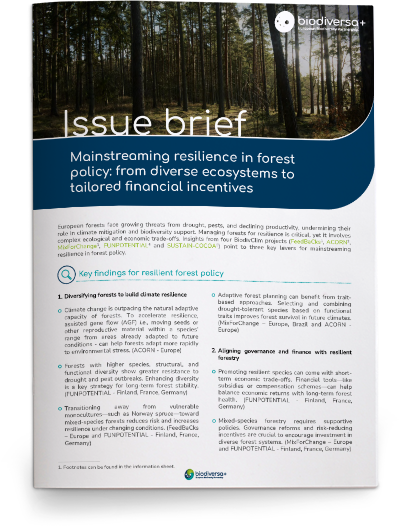Download the issue brief
Issue brief: “Mainstreaming resilience in forest policy: From diverse ecosystems to tailored financial incentives”
European forests face growing threats from drought, pests, and declining productivity, which undermine their crucial role in climate mitigation, biodiversity support, and rural economies. Building resilience is therefore essential, but it requires balancing ecological realities with economic trade-offs.
This issue brief brings together insights from five research projects:
- FeedBaCks, on biodiversity-climate feedbacks and modelling
- ACORN, on assisted gene flow for adaptive forests
- MixForChange, on mixed-species forest management
- FUNPOTENTIAL, on trait-based forest resilience and economics
- SUSTAIN-COCOA, on governance lessons from sustainable cocoa in West Africa
Together, they show how forest policy, management, and finance can be aligned with climate resilience goals. This involves transitioning from monocultures to diverse, functional forest ecosystems, providing financial and policy support to foresters, and investing in harmonised tools for monitoring and modeling.
Main findings
- Diversifying forests is central to climate resilience. Climate change is outpacing the natural adaptation of many tree species. Moving away from vulnerable monocultures, such as Norway spruce, towards mixed-species forests reduces risk. The benefits depend not only on the number of species, but on having the right mix of traits, such as drought tolerance. Approaches like assisted gene flow can also help forests adapt more quickly to environmental stress.
- Governance and finance must support resilient forestry. Transitioning to mixed-species forests can involve short-term economic trade-offs, as more resilient species may be less productive. Addressing these barriers requires supportive policies and targeted financial tools, such as subsidies or compensation schemes, to balance economic returns with long-term forest health. Inclusive governance that involves smallholders is also important for fair and effective outcomes.
- Adaptive management relies on better data. Effective planning under uncertainty needs reliable, harmonised, and accessible data. There is a need for coordinated, EU-wide forest monitoring systems to track changes, compare management strategies, and guide adaptation. Integrating biodiversity data into climate models is also important for improving risk assessment and ensuring policies benefit both climate and nature.
